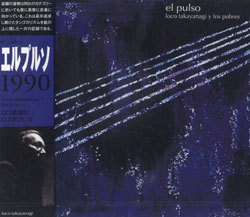
One of the strangest items in the Takayanagi (New Direction Unit) discography:- an acoustic guitar nontet playing covers of South American tango, milonga, vals, rumba, &c.
In Stock
Quantity in Basket: None
Log In to use our Wish List
Shipping Weight: 6.00 units
EU & UK Customers:
Discogs.com can handle your VAT payments
So please order through Discogs
Sample The Album:
Masayuki Takayanagi-guitar
Fontella Bass - 井野信義
Guitar - 松岡昭 , 丹羽英敏 , 高柳昌行 , 宮崎伸一 , 坂本堪亮 , 佐藤敏夫
Guitar - 池田正治朗
Click an artist name above to see in-stock items for that artist.
Label: Jinya Disc
Catalog ID: B-0004
Squidco Product Code: 9456
Format: CD
Condition: New
Released: 1995
Country: Japan
Packaging: Jewel Tray
Recorded 1 August 1990 at Pit Inn, Tokyo (tracks 1-14), and 28 October 1990 at JeanJean, Tokyo (tracks 15-17).
One of the strangest items in the Takayanagi (New Direction Unit) discography:- an acoustic guitar nontet playing covers of South American tango, milonga, vals, rumba, &c.
Artist Biographies
• Show Bio for Masayuki Takayanagi "Masayuki 'Jojo' Takayanagi (高柳昌行) (December 22, 1932 - June 23, 1991) was a Japanese jazz / free improvisation / noise musician. He was active in the Japanese jazz scene from the late 1950s. In the 1960s he formed New Directions (later New Direction Unit), which recorded several albums throughout the 1970s. He also recorded several albums with saxophonist Kaoru Abe, including Kaitai Teki Kohkan, Gradually Projection and Mass Projection." ^ Hide Bio for Masayuki Takayanagi • Show Bio for Fontella Bass "Fontella Marie Bass (July 3, 1940 - December 26, 2012) was an American R&B and soul singer-songwriter best known for her number-one R&B hit "Rescue Me" in 1965. She has been nominated for a Grammy Award twice. Born on July 3, 1940, in St. Louis, MO; daughter of Martha Bass (a gospel singer); married Lester Bowie (a trumpet player); divorced, 1978. Fontella Bass may be best known for her recording, "Rescue Me," which became a number one rhythm-and-blues hit and reached both the British and American top 20 on the pop charts in 1965, securing her a place in the pantheon of classic pop female singers of the 1960s. She also recorded the classic "Don't Mess Up a Good Thing" as a duet with Bobby McClure in 1965. Following her flirtation with success she relocated to Paris with her husband, avant-garde trumpet player Lester Bowie, who was a member of the Art Ensemble of Chicago. She retired from the music business to raise a family in the 1970s, but reappeared as a gospel singer in the 1980s. In 2002 she re-emerged as a singer on several songs for the trip-hop group Cinematic Orchestra, with whom she also toured. Bass was born and raised in St. Louis, Missouri. Her mother, Martha Bass, was a professional singer with the Clara Ward Singers, a gospel group that toured with the Reverend C. L. Franklin, the father of Aretha Franklin. She was raised by her grandmother, Nevada Carter, when her mother toured. Musically precocious, Bass was five years old when she began accompanying her grandmother on piano when the older woman sang at funeral services. Before she turned ten, Bass was traveling with her mother on tours with the Clara Ward Singers throughout the South and Southwestern regions of the United States. As a teenager she was introduced to secular music by her musician uncles, who would sneak the young piano player and singer into blues clubs in St. Louis. Before long, Bass succumbed to the lure of the stage. She began performing professionally at various clubs along the Mississippi River when she was 17. Her mother would not allow Bass to tour with a carnival, however, so she stayed in St. Louis where she accepted work as a piano player for bluesman Little Milton Campbell. After Little Milton was offered a recording contract with Chicago's preeminent blues label, Chess Records, Bass was given the opportunity to sing with the band as well as play piano. When Little Milton and his bandleader, saxophonist and arranger Oliver Sain, parted ways, Bass followed Sain. The Oliver Sain Soul Revue featured Bass, singer Bobby McClure, and trumpet player Lester Bowie. Bass, however, also wanted to perform and record with other bands in the St. Louis area, most notably with Ike Turner and his Kings of Rhythm and with Tina Turner. Sain was not amenable to allowing Bass such liberties, prompting Bass and her new husband, Bowie, to move to Chicago in 1965. She had met brothers Phil and Leonard Chess of Chess Records when she performed with Little Milton, and they signed her to Checker, their R&B subsidiary label. Bass attained success immediately with "Don't Mess Up a Good Thing," a classic duet performed with McClure. The song features both man and woman presenting a laundry list of each others' perceived slights and misbehaviors. Each singer admonishes the other, warning that if such behavior persists, he or she will "mess up a good thing." Written by Oliver Sain, the song's balance of male and female wrongdoings and indiscretions is reminiscent of the country music single "Wild Side of Life" by Hank Snow, and the female response "It Wasn't God Who Made Honky Tonk Angels" by Kitty Wells. It also recalls the classic song of a co-dependent couple, "Fairy Tale of New York," by the Pogues, with Kirsty MacColl. "Don't Mess Up a Good Thing" became a moderate rhythm and blues hit in 1965, and was re-recorded in 1979 by Ry Cooder and Chaka Khan on the former's Bop Till You Drop. If "Don't Mess Up a Good Thing" put Bass on music lovers' radar, her follow-up Checker single, "Rescue Me," planted her solidly on AM radios and jukeboxes and on film and television soundtracks. A song in the classic Stax/Volt mode, with a driving bass line and crackling horn section, the song also features spine-tingling gospel call-and-response vocals. The song shot to number one, on the combined strength of Bass's vocal performance and rhythm piano, the instrumental support of horn man Gene Barge and drummer Maurice White, and backup singing from Minnie Riperton. It reached number one on the R&B charts, and crossed over to the pop charts in England and the United States. The song's writing credits went to Carl William Smith and Raynard Miner, although Bass claimed to have created the song's melody over that pair's lyrics and rhythm. "I was part of the writing team at Chess Records in Chicago," Bass told People magazine writer Steve Dougherty. "One day I stopped by the studio and Raynard was in the rehearsal room. We made up the whole thing, lyrics and everything on the spot. I played rhythm piano and sang the melody lines." According to Bass, the song was recorded in three takes. She told Dougherty, "I was so excited about that song. I told all my friends, 'I think this is the one.' The record came out, and my name was not on the sleeve [as cowriter]. And when I asked about it, [the people at the record company] told me, 'Don't worry, we're gonna change that.' But they never did." As a result, the only songwriting royalty Bass received for the song was $11,000. In 1991, however, she won a lawsuit to reclaim performance royalties when credit card company American Express and their advertising agency Ogilvy & Mather failed to obtain Bass's approval to use "Rescue Me" in a commercial. At that point, according to Newsweek's Karen Schomer, "She was broke, tired and cold; the only heat in her house came from the gas stove in the kitchen." Schomer quoted Bass: "I said, 'I need to see a sign to continue on.' And all of a sudden on the TV I heard ... 'Rescue Me.'" Bass reportedly received a settlement in excess of $50,000, as well as punitive damages. Bass recorded one more moderate hit for Checker titled "Recovery," but felt that the label was simply trying to create a formula out of "Rescue Me." She recorded advertising jingles for Sears, Nehi soft drinks, Lincoln-Mercury, and AC Delco Spark Plugs. By this time, Lester Bowie was ensconced in the jazz avant-garde of Chicago with his band the Art Ensemble of Chicago, and Bass traveled with the band to Paris for a three-year stint. She returned to the United States to raise her children in the 1970s, and divorced Bowie in 1978. She recorded sporadically throughout the 1980s and even re-teamed with Oliver Sains for a spell, but with little success. In 1994 she recorded Breath of Life with the World Saxophone Quartet. She signed with Nonesuch Records in 1995 and recorded No Ways Tired, a gospel album with jazz and blues overtones. Dougherty described Bass's performance on the album: "Just because she's gone upper case and holy doesn't mean she has lowered the flame. This collection rocks. Singing her perfect-pitch praises of the Lord as fervently and enticingly as she ever called a lover, Bass gives traditional sounding gospel numbers like 'You Don't Know What the Lord Told Me,' 'All My Burdens,' and 'Everlasting Arms' an irresistible, head-over-heels swing." The album featured musicians Harvey Brooks on bass guitar, saxophonist David Sanborn, and organist Donald Smith. After several more gospel releases, Bass performed guest vocal duties on the Cinematic Orchestra's 2002 album and tour. In 2003 the Westside label released Free, a collection of recordings Bass made on the Paula label in the 1970s."-Bruce Walker, Musician Guide ^ Hide Bio for Fontella Bass
11/18/2024
Have a better biography or biography source? Please Contact Us so that we can update this biography.
11/18/2024
Have a better biography or biography source? Please Contact Us so that we can update this biography.
Track Listing:
1. Leguisamo Solo 2:23
2. Murmullos 2:36
3. Silencio 2:45
4. Milonga Del 900 2:01
5. Ataniche 2:18
6. Ay, Aurora 2:31
7. Intimas 2:27
8. Mi Buenos Aires Querido 4:42
9. Dos Amigos 4:11
10. Margaritas 2:43
11. Volver 2:44
12. Sol Tropical 2:45
13. Amemonos 2:55
14. Ausencia 2:16
15. Caprichosa 2:53
16. Medallita De La Suerte 2:33
17. El Tango Es Azul 2:53
Doubtmusic
Rock and Related
Improvised Rock
Japanese & Asian Improv/Rock
Asian Improvisation & Jazz
Quartet Recordings
Search for other titles on the label:
Jinya Disc.



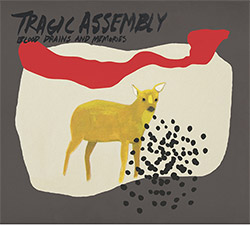
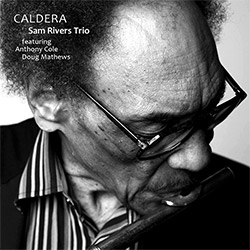
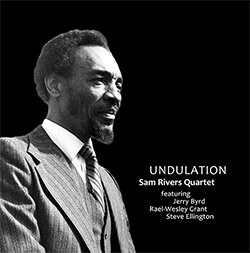
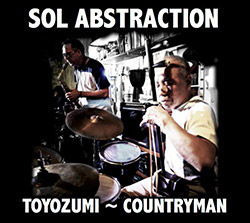
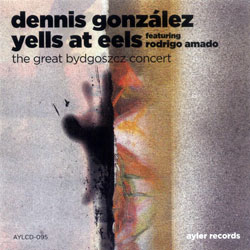
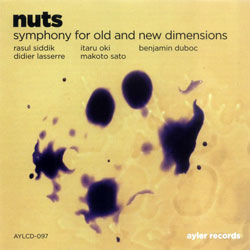
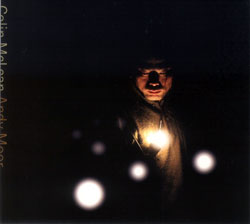
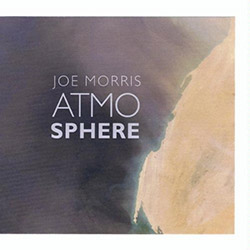
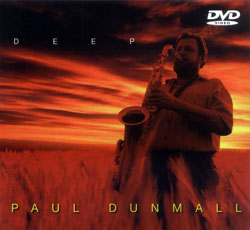














![Barker / Parker / Irabagon: Bakunawa [VINYL]](https://www.teuthida.com/productImages/misc4/35533.jpg)
![Blaser, Samuel / Marc Ducret / Peter Bruun: Dark Was The Night, Cold Was The Ground [VINYL 10-inch]](https://www.teuthida.com/productImages/misc4/35492.jpg)










![Warren, Kenny (Warren / Hoffman / Ellman): Sweet World [VINYL]](https://www.teuthida.com/productImages/misc4/35451.jpg)


![Blake, Ran / Dave Knife Fabris: Live Amsterdam 2006, First Visit [CD + POSTCARDS]](https://www.teuthida.com/productImages/misc4/35275.jpg)
![Sanna, Claudio: Compositori Sardi Contemporanei II [2 CDs]](https://www.teuthida.com/productImages/misc4/35317.jpg)












![Nevai, Nandor: <<The PRICE of FRONTIER>> Book 1: FULK [BOOK + 4 CDs]](https://www.teuthida.com/productImages/misc4/35464.jpg)
![Nevai, Nandor: <<The PRICE of FRONTIER>> Book 2: MARTIAL [BOOK + 4 CDs]](https://www.teuthida.com/productImages/misc4/35465.jpg)
![Nevai, Nandor: <<The PRICE of FRONTIER>> Book 3: JASSOM [BOOK + 4 CDs]](https://www.teuthida.com/productImages/misc4/35466.jpg)
![Nevai, Nandor: <<The PRICE of FRONTIER>> Book 4: HARD-WON [BOOK + 4 CDs]](https://www.teuthida.com/productImages/misc4/35467.jpg)






![DNS: Taking Big Bites Of The Khandas Three Cafes Deep [2 CDs]](https://www.teuthida.com/productImages/misc4/35334.jpg)




![Cleaver, Gerald: The Process [VINYL]](https://www.teuthida.com/productImages/misc4/34966.jpg)




![Alva Noto: HYbr:ID II [VINYL 2 LPs]](https://www.teuthida.com/productImages/misc4/35201.jpg)

![Baron, Derek / Luke Martin: Distinct and Concealed [CASSETTE + DOWNLOAD]](https://www.teuthida.com/productImages/misc4/35079.jpg)

![Lyle, Erica Dawn : Colonial Motels [CASSETTE + DOWNLOAD]](https://www.teuthida.com/productImages/misc4/35080.jpg)







![Alva Noto: HYbr:ID III [VINYL 2 LPs]](https://www.teuthida.com/productImages/misc4/35011.jpg)
![Kubisch, Christina / Trondheim Voices: Stromsanger 2022 For Six Voices And Electromagnetic Waves [VINYL]](https://www.teuthida.com/productImages/misc4/34628.jpg)








![Zurria, Manuel: Fame di Vento [3 CDs]](https://www.teuthida.com/productImages/misc4/35167.jpg)

![Granberg, Magnus / Nattens Inbrott / Skogen: Holde Traume, Kehret Wieder! [2 CDs]](https://www.teuthida.com/productImages/misc4/35038.jpg)
![Frey, Jurg: Outermost Melodie [2 CDs]](https://www.teuthida.com/productImages/misc4/35039.jpg)

![Pavone, Jessica: Reverse Bloom [VINYL]](https://www.teuthida.com/productImages/misc4/34895.jpg)




![Modney (Modney / Wooley / Gentile / Roberts / Pluta / Symthe / ...): Ascending Primes [2 CDs]](https://www.teuthida.com/productImages/misc4/34852.jpg)








![Elephant9 with Terje Rypdal: Catching Fire [VINYL 2 LPs]](https://www.teuthida.com/productImages/misc4/35355.jpg)
![Deerlady (Obomsawin, Mali / Magdalena Abrego): Greatest Hits [VINYL]](https://www.teuthida.com/productImages/misc4/34876.jpg)




![Haino, Keiji: Black Blues [2 CDs]](https://www.teuthida.com/productImages/misc4/35109.jpg)



![Surplus 1980: Illusion of Consistency [CD]](https://www.teuthida.com/productImages/misc4/35069.jpg)
![Staiano, Moe: Away Towards the Light [VINYL + DOWNLOAD]](https://www.teuthida.com/productImages/misc4/35037.jpg)




![Caveira (Gomes / Sousa / Abras / Ferrandini): Ficar Vivo [VINYL]](https://www.teuthida.com/productImages/misc4/34643.jpg)
![Gregg, J. J. / David Van Auken: Lunar Prairie [CD w/ DOWNLOAD]](https://www.teuthida.com/productImages/misc4/34611.jpg)

![Coultrain: Mundus [VINYL]](https://www.teuthida.com/productImages/misc4/32439.jpg)
![Mattin: Songbook #6 [VINYL]](https://www.teuthida.com/productImages/misc4/27317.jpg)
![Punkappella: Wake Up [7-inch VINYL]](https://www.teuthida.com/productImages/misc4/17519.jpg)
![Residents, The: WARNING: UNiNC.: Live And Experimental Recordings 1971-1972 [VINYL 2 LPs]](https://www.teuthida.com/productImages/misc4/31521.jpg)
![Coultrain: Phantasmagoria [VINYL]](https://www.teuthida.com/productImages/misc4/30142.jpg)
![Lennon, Sean Ono: Asterisms [VINYL]](https://www.teuthida.com/productImages/misc4/34517.jpg)

![Rotem Geffen: The Night Is The Night [VINYL]](https://www.teuthida.com/productImages/misc4/34631.jpg)
![Coley, Byron: Dating Tips for Touring Bands [VINYL]](https://www.teuthida.com/productImages/misc4/17906.jpg)

![Lost Kisses: My Life is Sad & Funny [DVD]](https://www.teuthida.com/productImages/misc4/lostKissesDVD.jpg)